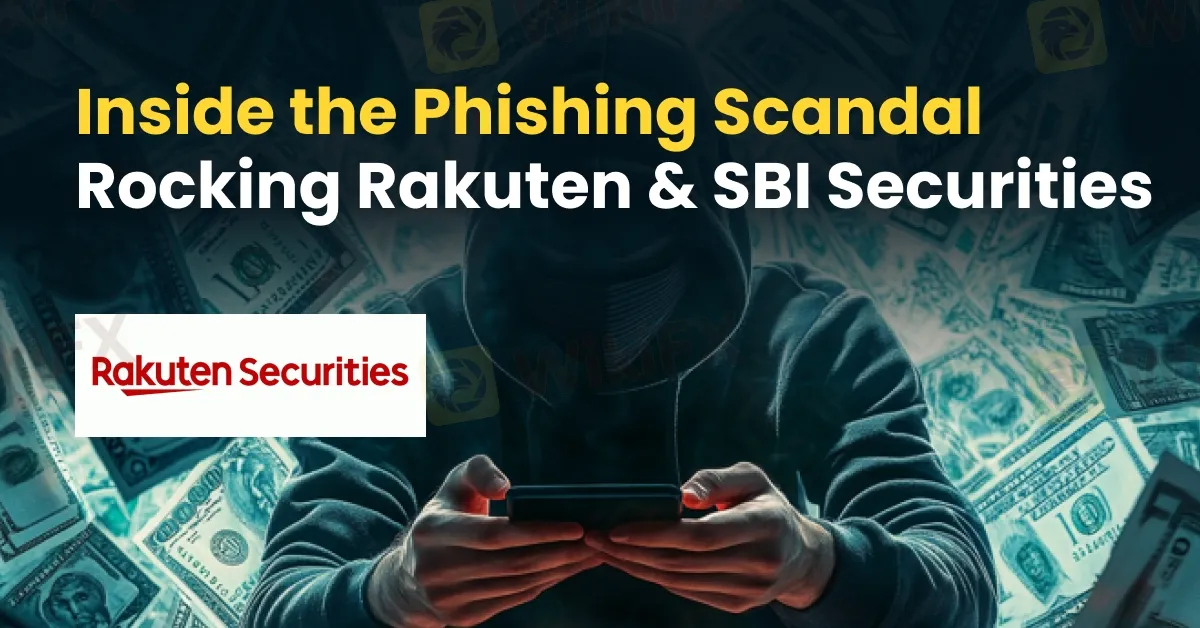简体中文
繁體中文
English
Pусский
日本語
ภาษาไทย
Tiếng Việt
Bahasa Indonesia
Español
हिन्दी
Filippiiniläinen
Français
Deutsch
Português
Türkçe
한국어
العربية
Inside the Phishing Scandal Rocking Rakuten & SBI Securities
Abstract:Rakuten Securities Inc., one of Japan’s leading online brokerage firms, has ramped up its identity verification measures after falling victim to a wave of fraudulent transactions.

Rakuten Securities Inc., one of Japans leading online brokerage firms, has ramped up its identity verification measures after falling victim to a wave of fraudulent transactions. The incidents, which surfaced in March, were linked to phishing attacks that tricked customers into revealing sensitive login credentials.
The fraudulent activity involved the unauthorised sale of customers‘ stocks and investment trust funds. The proceeds were then used to purchase low-volume stocks in Chinese companies without the account holders’ consent. Rakuten Securities confirmed the transactions had not resulted from an internal data breach, suggesting that customer information remained secure on its servers. However, the company declined to disclose the number or extent of affected transactions, citing concerns over potential repeat offences.
Investigations indicate that phishing emails, mimicking official communication from Rakuten Securities, were at the heart of the scam. These emails urged recipients to confirm their account information for security purposes. Victims who clicked on the provided links were redirected to counterfeit websites designed to steal login details. Once compromised, their accounts were hijacked and manipulated.

The attackers typically sold off the victims existing assets and used the funds to buy Chinese stocks. While the motive behind choosing such stocks remains unclear, company officials suspect that the perpetrators are part of a larger scheme to artificially inflate prices and offload their holdings at a profit.
In response, Rakuten Securities introduced a new security feature on 23 March known as “risk-based authentication.” This mechanism prompts users to provide additional identity verification if they access their accounts using unfamiliar devices. Customers must also call a specific toll-free number from a phone registered with the firm to complete transactions. No prior arrangement is required for this verification process. The firm has also encouraged users to update their PINs as an added precaution.
SBI Securities Co., another prominent Japanese brokerage, has reported similar incidents, although on a significantly smaller scale. Like Rakuten, its customers were targeted by deceptive emails claiming their accounts had been temporarily suspended due to suspicious activity. The emails instructed users to re-enter their credentials to restore access, leading many to unwittingly disclose their private information.
SBI Securities has since decided to strengthen its security infrastructure. Previously, customers only had to undergo two-factor authentication when withdrawing over 500,000 yen (approximately $3,320). From 9 May onwards, this security measure will apply to all withdrawals, regardless of the amount.
Both firms are urging clients to remain vigilant, avoid clicking on unsolicited links, and refrain from entering personal data on suspicious websites. These events underscore a growing threat to online investors, with phishing scams becoming increasingly sophisticated and difficult to detect. As financial institutions bolster their defences, customer awareness remains the first line of protection against these digital threats.

Disclaimer:
The views in this article only represent the author's personal views, and do not constitute investment advice on this platform. This platform does not guarantee the accuracy, completeness and timeliness of the information in the article, and will not be liable for any loss caused by the use of or reliance on the information in the article.
Read more

5 Cons of DB Investing Broker You Must Know
It's always advisable to read online review articles about forex brokers you are thinking to Invest your money with. The forex market has become increasingly unsafe due to the rise of fraudulent brokers. Review articles help you spot scam brokers and protect your money. Read this important article about DB Investing to stay fraud alert.

iForex - Where Withdrawal Denials, High Spread & Scams Spoil Your Forex Trading Mood
Are high spreads charged by iForex disallowing you to make profits? Do you feel that you will never be able to withdraw from iForex? It's nothing new! Read this exposure story where we have highlighted complaints from several investors.

Forex Hedging Strategies - Calming You Amid Market Chaos
Finding it hard to deal with the forex market volatility? Do those ups and downs in currency pair prices make you more nervous or worried? You need the right forex hedging strategies. As a concept, forex hedging is about strategically opening additional positions to stay immune against adverse forex price movements. It’s about offsetting or balancing your current positions by buying or selling financial instruments. As a trader, your risk exposure is reduced, hence limiting your potential losses.

Scam Alert: Cloned Broker Scams on the Rise
Reputed authorities like the FCA have issued warnings against brokers who act genuine but are actually fake brokers. They copy details such as logos, names, branding, and sometimes even employee appearances to trick investors and steal money from them.
WikiFX Broker
Latest News
Forex Hedging Strategies - Calming You Amid Market Chaos
Key Events This Week: ISM, Trade Balance And More Earnings
What Is Forex Currency Trading? Explained Simply
A Beginner’s Guide to Trading Forex During News Releases
Ultima Markets enters the UK and gains the FCA license
LSEG Announces £1 Billion Share Buyback Program
SEC Lawsuit Targets Real Estate Fraud Scheme by Joseph Nantomah
ASIC Regulated Forex Brokers: Why Licensing Still Matters in 2025
Scam Alert: Cloned Broker Scams on the Rise
TradersWay Broker Review 2025: Unregulated Status and Global Warnings You Shouldn’t Ignore
Currency Calculator


